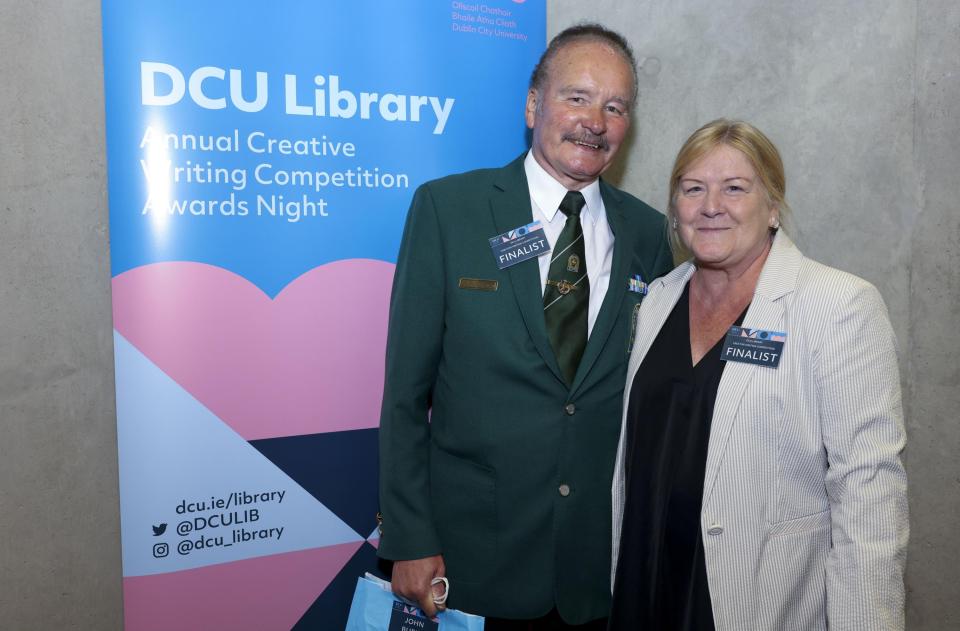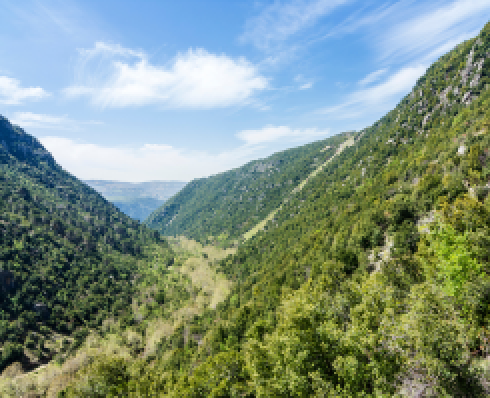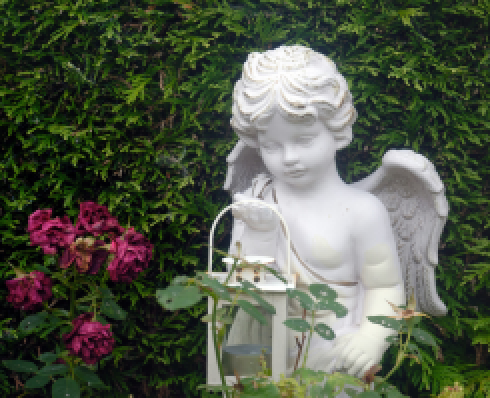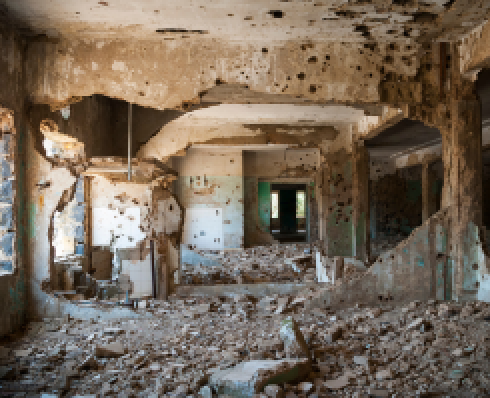DCU Library Creative Writing Competition Awards 2024











The annual DCU Library Creative Writing Competition is open to members of adult literacy reading and writing groups based on the northside of Dublin. This year, twelve writers were shortlisted for the award: the overall winner received a €100 book token and the remaining finalists received a €30 book token. The shortlisted entries were also printed in a booklet that was shared with the finalists, the tutors and the audience at the awards ceremony.

John and Theresa Burke
Our guest speaker, author and DCU writer-in-residence Aingeala Flannery announced this year's winning entry as 'The Wadi (Where Jesus Walked)' by John Burke, pictured here with his wife and fellow finalist Theresa Burke.
A copy of Aingeala Flannery's novel 'The Amusements' was awarded to each finalist.
The eleven remaining finalists were: Theresa Burke, James Dunne, Olivia Farrelly, Paul Flood, Dominic Gallagher, Gerard Loughnane, Derek Nibbs, Oliver, Paddy, Paul and Annette Rogers.
The winning and shortlisted entries can be read below - just click on each image to read the poem or short story featured.
A special mention goes to the fox who appeared outside the window during the awards ceremony as Gerard Loughnane read his story which features Trinity the fox - see him for yourself in the picture gallery above.
The Creative Writing Competition has been running in DCU Library since 1999. Read some of the winning competition entries we have received over the years and discover the incredible talent of our local writers.
The awards night is always a special evening where we recognise the achievements of our finalists and their tutors and we celebrate everyone who takes part in the competition. It is one of the highlights of the year for DCU Library staff, who participate in the judging and organisation of the competition.

The Wadi (Where Jesus Walked) by John Burke
While on a tour of duty to Lebanon between October 1987 and April 1988 I was the NCO (Non-Commissioned Officer) in charge of the maintenance and servicing of all generators through our area of operations. It was Christmas morning and Operations had informed us of a generator down in Post 628/Alfa, so I loaded up my truck with all the equipment I thought I would need for the task ahead and headed off, alone.
To get to the post I had to travel through a village called Jouaiya which is right on the Israeli border. I drove into the village until I came to the first Irish outpost. As I went past the check-point I heard a shout ‘Stop!’ Looking in my rear-view mirror I could see a pair of arms frantically waving at me, so I stopped and reversed my vehicle back and asked him what the story was. ‘You have to check in with us first, then we radio ahead to 628/Alfa that you’re heading in their direction, and then they inform the Christian militia who have a post beside theirs about you, which prevents them from blowing the you know what off you’, he replied. ‘Fuck that for a game of soldiers’, I said to myself, realising in that moment just how dangerous the territory I was heading into was.
On the next stage of the journey to my destination I had to drive into a valley (or wadi as it is named in Lebanon) and up a steep hill. I named the area God’s Valley when I learned later that Jesus had walked there when he went into the desert wilderness for forty days and nights. Many centuries after this the Christian Crusaders built a castle at a height overlooking the wadi which is still standing to this day. When I get to 628/Alfa, I parked the vehicle and gathered all my tools, not forgetting my Gustaf Sub Machine Gun, as I had to make the remaining part of the hill on foot.
Then I noticed a small donkey grazing on the hill side, a lovely sighting on that Christmas morning. I approached the donkey and it turned to look at me.
Reaching out my hand the donkey licked it. I carried on and made my way up the hill and into the compound where I was greeted by happy smiling faces. It was my job to keep the smiles there by sorting out the problem with the generator. On inspection I discovered the fuel tank was full to the brim, a tell-tale sign the generator had been allowed to run out of diesel and was now air locked. I got it running again and checked the back-up one where all was well. After that, I gathered up my tools and made my way back to the vehicle where the donkey still was, as if waiting for me. ‘Goodbye my donkey friend’ I shouted out and after packing up I headed back into the valley once again.
As I drove back up the steep hill that evening I stopped the vehicle for a few moments. Looking in my rear-view mirror I could see the Crusaders’ castle proudly standing in the background, and I noticed how beautiful the valley was, even as the light was fading. When I get back into Camp Shamrock, I parked up the vehicle and made my way to my bunk where I reflected on that journey, on all I had seen and on the little donkey and I realised how special and spiritual it had been. To the present day, I often think of that Christmas morning and I wonder what the man above was thinking and what he did and what he noticed as he passed through the wadi. As he headed back to Jerusalem, did he know and reflect on the persecution he would face, and his death on a cross?
Although objectively the wadi was a particularly dangerous place to travel through alone, paradoxically, God’s valley was the only place in Lebanon where I really felt safe.
CDETB Irish United Nations Veterans Association

Angels' Corner by Theresa Burke
The excitement waiting on the two blue lines to appear,
then the panic sets in.
You hope you do all the right things
to keep your baby safe.
You both agree not to tell anyone
until you feel the time is right
to start planning for the future.
Then the excitement when you go for your first check-up.
Then the silence.
The scan shows a picture, but no sound.
The silence
where there should have been a heartbeat,
beating as one with yours.
The silence is deafening.
The delivery day is coming, even if you don’t want it to.
The silence.
No crying sounds, no tears of joy,
only sadness fills the air.
The silence.
The days go by so slowly, you function on autopilot.
It’s time to say goodbye
to what should have been your bundle of joy,
your future.
With your little white box on your lap
you go to the graveside,
to the angels’ plot
where so many families have gone before you.
You bury your baby,
alongside all the other little angels.
The only comfort is thinking your baby won’t be alone.
The silence.
It fills you when you turn to go, leaving a piece of your heart
and your love behind you.
The silence.
CDETB Irish United Nations Veterans Association

The Bowtie by James Dunne
May twenty-third, 2015 was a beautiful sunny day in Dublin City. At the young age of 92 years old Jim looked out the window and smiled to himself, on such a lovely day he would make a plan and invite Rita out for lunch. He phoned Rita as he often did for a chat and suggested that maybe they would meet at the Church of Our Lady Help of Christians for morning mass on the Navan Road. Afterwards they would stroll back to her house for morning coffee near the church, because Jim lived in his sheltered living apartment for elderly residents in Cabra and would normally get the bus for the short journey. But today it would be different, he informed Rita that he would get early mass in Cabra and later on meet her for lunch in the Hole in the Wall pub beside the Phoenix Park on Blackhorse Avenue. Rita was delighted with Jim’s invitation and immediately agreed as they both made plans to meet up at 1pm.
As Jim hung up he smiled to himself as he was looking forward to a nice day out with Rita in the sunshine. He thought to himself that the first thing he would do was shower and shave, and then get out his clothes and lay them on the bed, for Jim was a dapper man who took pride in his appearance.
When he was shaved and showered he put on a clean shirt, freshly pressed trousers, polished shoes, a nice bright v-neck pullover, and a flashy sports jacket. Because spring was in the air he pondered if he should wear a cravat or a bowtie to top off his ensemble. Jim decided on the latter as it was brand new in the box and he hadn’t worn it since he had received it as a Christmas present and he liked all the bright colours that matched his jacket. Jim had many bowties as he never wore neckties because he had only one arm since an accident when he was a child and found them too difficult to tie, bowties or cravats suited him nicely.
In the year 1927 advanced medical practice had not come to rural Ireland and Castlecomer Co. Kilkenny was one of those rural towns. On that terrible day of the accident a young mischievous little 5 year old boy was playing on the railway line at the back of his house. Castlecomer, being a coal mining town had many shunter trains with coal filled carriages ready for transportation to the main cities and power stations around Ireland.
Health and safety was non-existent in those days and if a small boy was playing on the line, the worst that could happen to him would be to get a clip on the ear from a rail worker and told to run home to his mother, that’s how it was in those days back then. But little Jimmy as he was known back then, being the tough little ruffian that he was, didn’t go running to his mammy because he knew he would get another clip on the ear for playing on the tracks. Instead, Jimmy hid in the undergrowth until the rail man was gone. Then he went back to his little game of playing hide and seek underneath the rail carriages where he could slip in and out so easily with his brother and sister as he felt it was a great place to hide and couldn’t get caught.
But twenty carriages up the line Jimmy didn’t know that the man who clipped his ear was the shunter driver and having thought he had cleared the kids away from the train he started the engine in preparation to move the coal down the line. As the train surged forward all the following carriages would shudder and clank together until the wheels found traction on the rail, the noise would be deafening when this happened. But to a little five year old boy hiding under these carriages it would have been terrifying, so the first thing he would do was to run out from under the carriages to safety. Unfortunately his foot slipped on the loose rocks between the rails and he fell forward putting out his right arm to save himself which slipped forward laying across the track just as a wheel moved forward.
His poor brother and sister watched in horror as his little arm fell out onto the track and blood began to spurt from his severed wound. They both ran to a rail worker crying to tell him what had just happened, he in a panic, ran to the signal tower to put up the red flag and stop the train. Within minutes the train had stopped but it felt like hours when poor little Jimmy’s body was lifted out from under the carriages while his brother ran home screaming and crying to tell his mother of this awful tragedy.
His mother Margaret was hanging out washing in the sunshine when she heard her son running to her screaming and crying. She immediately knew that something terrible had happened as her heart sank and she was filled with dread. As Margaret raced to her child with tears streaming down her face she nearly dropped with fright. She could feel her legs buckling under her as she ran to see her little boy lifeless in the arms of a rail worker applying a tourniquet with his big leather belt from his trousers on the stump of little Jimmy’s arm to stop the massive loss of blood. Beside him stood the shunter driver in floods of tears wringing his cap in his hands while asking “was he dead?”
With her adrenaline running Margaret immediately took control of the situation. She yelled at the driver to snap out of it and get someone with a car to transport them to Kilkenny hospital. She knew time was of the essence and Jimmy was fading fast. She had to save her child. By the time they reached Kilkenny hospital Jimmy’s body was limp, his lips were blue and his skin was white as porcelain. When Margaret ran into the A&E with the child in her arms covered in blood the only three words she could call out pleadingly was “help him please!” In horror the A&E staff saw the little child in her arms with the tourniquet and an old shirt covering the wound. They immediately sprung into action grabbing Jimmy from her arms and rushing him into the operating theatre.
Hours passed before a doctor came out to Margaret. He told her that Jimmy was stable but in a coma and critical he was not sure if Jimmy would survive the trauma of what had happened to him. The only thing he could suggest for her right now was for her to go home and pray for her son. Margaret was horrified at the suggestion that while her son lay critical in bed. But the doctor explained that he wasn’t able to perform an operation to save his arm, and the only chance he had of surviving was that they had contacted a surgeon in Waterford hospital who had returned from the war in France. He told her that the doctor had a lot of experience with amputees, but given Jimmy’s size he might not survive the operation, especially if gangrene set in.
Margaret was devastated at this news, but she knew by the doctor’s demeanour and sadness in his voice that his heart was also breaking. She knew they were going to try everything to save her little boy. As she had six more children at home who needed her care and her poor husband James might not even know yet what has happened Jimmy, with a heavy heart she decided to go home and wait for any news. As the medics looked on with tears in their eyes, Margaret with an ache in her stomach and feeling like her heart was breaking bent over to kiss Jimmy’s little head while stroking his blond curls still covered in blood. She whispered in his ear for him not to leave her as she loved him so much and it would break her heart if he did, she told him to fight hard to stay with her.
When she got home to Castlecomer the whole town had already gathered in the local church in solemn prayer for little Jimmy as Margaret joined her husband and family at the front row to pray for his recovery. That night Margaret and James prayed hard together that little Jimmy would survive this awful ordeal, but the events of the day and as exhaustion took over they both drifted off into a fitful sleep.
Early the next morning Margaret got word from the local GP Doctor Ryan that the surgeon from Waterford had arrived in Kilkenny hospital. Doctor Ryan said that he would drive her to Kilkenny and accompany her and offer any advice that she might need. James had to go to work to support his family because in those days if you didn’t work, you didn’t get paid. The children were farmed out around the neighbours. When Margaret got to the hospital she was full of hope, until she was ushered in to meet Professor Bernard Foster. She expected to see a very distinguished tall gentleman in his sixties with greying hair, spectacles, a crisp white shirt and striped tie, under a three piece tailor made dark suit with pocket watch on a gold chain across his waist coat, and highly polished shoes. Instead stood a short man in his thirties, his long black greasy hair hung loosely from his head. He wore a shabby bulls wool open necked grandfather shirt, a brown corduroy jacket, corduroy trousers with dirty knees, and dirty brown shoes.
As she sat across from this man whose face was war torn from what he had experienced in the Somme, she could see he was worn and older than his years. Although PTSD (post-traumatic stress disorder) wasn’t known back then it was a symptom soldiers got from having witnessed unimaginable sights including those of men’s mutilated bodies being brought to be treated by the medics. As he looked down to read his notes on his desk she also detected a tremor in his hand; it was then Margaret’s heart sank.
Margaret tried to muster up some courage as she asked Professor Foster would he be able to help her little boy. But the answer he gave her as he sat with his head bowed in sorrow saying that there was little hope he could perform a successful operation. He continued, given that the boy was so weak from loss of blood and the fact that he had lost his arm above the elbow, meant the stump that was left would most likely get gangrenous which would mean he would die within hours. The doctor also explained that to try and remove the arm from the shoulder socket would present even bigger problems where blood arteries would have to be cauterised and the child’s little body might not be able to withstand such a traumatic intervention. He finished by saying that he had treated many similar wounds and would give a fully grown man a fifty/fifty chance of survival, but a little boy would probably die under the anaesthetic and trauma of the operation alone.
Margaret was devastated as she began to cry. Doctor Ryan who was sitting beside her took her by the hand as he nodded his corroboration at what the professor had diagnosed, as they all bowed their heads in silence and quiet prayer. Margaret knew she wasn’t giving up on her son. So she slowly lifted her head she gently reached across the desk and took the professor’s trembling hand in hers. As he bowed his head she whispered over to him that yes, he had seen and tended many terrible mutilations during the war, and from those terrible things he had learned to help and save many lives that were destroyed by hatred. But, the little boy laying in the other room slowly dying without any chance of fighting back was not there because of hatred or war, he is there because God and his angels have sent him to YOU, to prove that YOU are a man of healing and for all you have seen and done, YOU have a great knowledge and a power to continue saving and improving lives for many years to come.
She continued softly, I know you are afraid you might lose him, but his guardian angel is watching over him at this very moment and if he feels it is Jimmy’s time, he will take him in his arms straight to God so he can become an angel also. When she had finished, Margaret looked at the top of the professor’s bowed head for what seemed like minutes. When he slowly lifted his head and looked at her she could see a light in his eyes and a look of hope that wasn’t there before as he lifted his other hand to place it on top of hers. He then smiled at her and said he would try his best, and thank you for having faith in me.
Faith or not, Margaret knew that Professor Foster was little Jimmy’s only hope and she prayed that he would be strong enough to get him to withstand such a big operation. Eighteen hours had passed before Professor Foster came out from the operating theatre totally exhausted. Two shifts of theatre staff had changed over while he performed the operation on little Jimmy. As he removed his blood-stained hat and gown he informed the intensive care staff that he was going to lie down for a few hours, but first he wanted to speak to Margaret who never left the oratory where she prayed and lit candles the whole time.
She saw him approaching with a hopeful smile on his face while saying that Jimmy was a tough little lad and it was all up to him now to pull through as there was no more he, Doctor Foster, could do for him. Margaret ran to his open arms and hugged him tightly while whispering in his ear, “thank you, thank you, you wonderful man.” It was a further forty-eight hours later that little Jimmy opened his eyes and weakly asked for his mammy. The word spread through the hospital like wildfire that Jimmy had woken up. Even the patients in the other wards were clapping with gratitude and joy that this little hero had pulled through.
Little Jimmy became the hospital mascot as he got stronger and stronger. In the six months he spent in hospital after the surgery he would walk from ward to ward with his lovely blond curls delighting patients while he visited them, and of course he would fill his pockets with sweets from their lockers at the same time. The nursing staff loved him also and would give him little jobs to do around the wards etc. like delivering papers and letters to the patients; the hospital was a happier place because of him. When it was time for him to be discharged, they all got together and held a farewell party. There were a few tears shed that day as he went from ward to ward to say goodbye to everyone.
When he got home to Castlecomer, a street party was held in his honour attended also by the railway staff. It was a further year before Jimmy could go back to school and he blended in very easily as Margaret taught him to write and work with his left arm.
As he started to grow, there was no challenge that Jim could not overcome. He became a very good swimmer where he swam most days in the River Nore. On one occasion he dived into the river to save a person who had gotten into difficulty and was mentioned in the local paper for his heroics.
During the Second World War he joined the LDF (Local Defence Force) and served in the signal corps. This was strange as a person would need to have two arms to send semaphore signals, but Jim served his time in the emergency until they were demobbed.
There was no such thing as compensation in those days, but the old railway company of Córas lompair Éireann or C.I.E which is now known as TFI (Transport for Ireland) offered him a job for life working on the railway whenever he finished school and wanted to take up a position. So Jim took up his first job as a porter in Kilkenny train station.
At the age of twenty one he was promoted as foreman and Jim moved to Pearse Station Westland Row Dublin and moved into digs in Rathmines. He continued his swimming and as he had no fear of anything he joined Clontarf swimming and diving club where he would regularly climb the ladder to the top platform to perform a dive while onlookers would watch him in awe. Jim also loved to dance and would attend all the dance halls in Dublin City, such as Cleary’s and the Metropole Ballrooms. So it was on such a night he met Lily who also was an excellent dancer. They fell in love and before long they were married and moved to Phibsboro beside Broadstone Train Station.
It seemed Jim could never really move away from railway tracks, as he would say “part of his DNA was in those tracks.” Afterwards Jim was promoted again, to Inspector on Houston Station Kingsbridge. Here he became a well-known celebrity and was referred to as the dapper man on the platform with the one arm who always wears a fancy bowtie and had a fresh rose in his lapel. Lily always made sure he was turned out for work, dressed immaculately with his cap with gold braiding on the peak, crisp white shirt, and the rose in his great coat.
He talked about the many celebrities he would meet on the station. But his favourite one was our own president Michael D. Higgins who as a young man travelling from Galway or Tullamore while courting his future wife Sabina, he would always stop for a few friendly words.
Having the one arm never impeded him in any way. He loved the nick-names he was called, like Lefty, the one armed man, from the TV series and film The Fugitive. His family and grandchildren knew him fondly as George, but the strangest of his names was Flanagan. We laughed when Jim was introduced to my future father-in-law, a postman who used to bring mail to meet the mail train, he knew Jim as Mr Flanagan and wondered how I was Jimmy Dunne his son!
Jim would always tell tall stories to his grandchildren of how he lost his arm and the gorier the story was the better. While they listened wide eyed with open mouths he would tell them about wrestling alligators in the Everglades of Florida. Or surfing the Great Barrier Reef off Australia and being attacked by a great white shark. Or his favourite, that Piranha fish had nibbled up his right arm all the way to the top when he was up the Amazon Basin. The same Piranha fish were afraid to eat the left arm because he had a spear gun in it and they were afraid they would be shot.
Another story he told about his arm was how he had put his hand out the car window to turn right and another car driving past took it off. Our kids, Jim’s grandchildren, never put their arms out of a car window after that.
At the age of sixty he retired from the railway, took his first driving lesson and bought his first car. He joined Forest Little Golf Club and became so good at the game he represented Ireland in St Andrews Scotland at the One Armed Golf Championships. The tournament was attended by amputees from France, Germany, England, Canada, and the USA.
He and Lily continued touring Ireland dancing together until Lily’s passing at the age of sixty six. After that Jim continued travelling to Spain with his many friends in dancing groups. One such friend was Rita who was also a keen dancer; she was nine years younger than Jim and had also lost her husband years previously. She was about five feet tall, very respectable and had lovely soft skin and small dainty hands. They were great friends. Jim would have known her mother and father Minnie and Jim. So Jim and Rita bonded quite easily, going out for meals and dancing. Over the next few years they became closer and decided to get married. The wedding day was fantastic, the June sun shone brightly as they took their vows watched on by their loving families and many grandchildren. There were two receptions. One was held in the afternoon at Dublin Zoo restaurant where a mini disco, face painting, and magic show was put on for the grandchildren, and a second reception was held that night in Forest Little Golf Club with a full sit-down meal followed by dancing to a full band where Jim and Rita took to the floor into the early hours of the morning.
But a couple of years later both Jim and Rita being set in their own ways decided that being married rather than friends was not for them. Jim moved to Cabra where he settled happily and Rita stayed on in her house. Their good friendship continued and they would eat out, go on holiday, and dance together regularly. They had their own routine and would also meet for lunch and meals out with plenty of good wine of course.
So, back to what happened that day the 23rd May 2015 when Jim asked Rita out to lunch. At the appointed time he caught the bus and Rita was waiting for him at the bus stop on the Navan road. After their rendezvous they walked arm in arm slowly down to the pub, happy to be in each other’s company while chatting away. On reaching the pub they took up a nice seat in the courtyard outside in a sunny spot where they ordered a bottle of good wine to share and then pondered the menu. After a lovely lunch and draining the wine bottle they looked at each other mischievously. Jim asked Rita with a smile on his face, “do you think we should chance another bottle?” “Go on,” she said, “we might as well be hung for a sheep as a lamb.”
So they sat back and enjoyed each other’s company, chatting away and having a laugh while enjoying their wine. Later they noticed that the waiters were pulling tables together in preparation for a big party of about fifteen people quite close to where they were sitting. Soon after, the customers started to arrive and take their seats. As they did so, each one stopped and looking over towards Jim waved and smiled and mouthed the words “thank you” before taking their seats. Jim and Rita were confused why this was happening, but being a friendly jolly couple they would smile and wave back, there were about fifteen people gathered at the other table.
Later on as Jim and Rita were finishing up their afternoon and preparing to leave, the waiter arrived at their table with a bottle of a more expensive quality wine than they had been drinking. Thinking the waiter had made a mistake they tried to explain that they hadn’t ordered the wine, but the waiter told them that the big table had clubbed together to pay for it. Not to offend the people who sent the wine over they accepted it gratefully and gestured their thanks over to the group. The whole group waved back and smiled saying that they were most welcome as they carried on talking excitedly between themselves.
The wine tasted wonderful and Jim and Rita enjoyed every drop as they sat back and relaxed again. They spoke to each other in hushed tones saying that it was nice of the young people to send a bottle of good wine over to the old people as they thought the gesture was motivated by respect for their elderly age. After a lovely afternoon and feeling a little groggy and a bit tipsy from all the wine they decided to call it a day. But before leaving they both waved over at the big table thanking them again for the wine. The people all stood up and bowed at the couple while saying “not at all, and thank you again.”
Jim and Rita were confused as they walked home as to why the people were thanking them but couldn’t decide what the reason might be.
When they reached Rita’s house she invited Jim in for coffee to try and sober him up a little before he went home. She knew her son would be home soon and could run Jim around to his own house in the car.
When her son arrived soon after Jim and Rita regaled him about the events of their afternoon and how respectful they thought the young people were to them because of their age. After listening to their story Rita’s son started to laugh and explained they didn’t get the wine because they were old but because the new bowtie Jim was wearing was in the rainbow colours. He explained to them both that on this day May twenty-third 2015, Ireland had become the first country in the world to legalise same sex marriage.
As the events of the afternoon dawned on them they all laughed together as Jim explained that he only wore the bowtie that his daughter had bought him as a Christmas present as he liked the bright colours.
Yes, Jim was indeed a dapper man!!!
CDETB Irish United Nations Veterans Association

The Fear by Olivia Farrelly
Elaine stood in the harsh light of the cubicle. She wished with all her might that she was anywhere but here. She had managed to avoid this scenario for sixty years but guess what, now she was here today. She had stripped off as required and now her pale bare skin was goosebumped like a plucked chicken, her skin shocked by the realisation of what was about to happen.
Elaine’s stomach felt queasy as she took in small shallow breaths. Her heart was busy thumping in her chest. She tried to tell herself to get a grip. In an hour’s time it would all be over and she may never have to come back here again. Her body and her mind refused to listen, both had gone into overdrive. Fight or flight hormones rushing through her blood vessels, pounding in her head.
Elaine felt a wave of dizziness engulf her as she made her way to the cubicle door. “Oh God don’t let me faint,” she prayed silently. Then with a clammy shaky hand she opened the cubicle door and cautiously stepped out. It was time to face her fear. The pungent smell of bleach clogging the air.
A chirpy lady with a whistle on a chord around her neck brusquely strode by.
“Welcome beginners class,” she called.
“Let's make our way to the swimming pool.”
CDETB Adult Education Finglas

Caught in the Moment of Time by Paul Flood
Looking at the spider running across the ceiling,
Stuck in an ocean of white space looking for cover,
And finding it in the crack of light shade.
The sun is rushing through the blinds and listening to
the morning sounds,
Children running and singing with happiness, hearing
the banging of cups,
Ma calling us to get out of bed for school
Almost finding myself
Getting up out of bed and realising there’s a big knot
in the centre of my stomach.
Is it something that I’m longing for that I miss?
Or is it anxiety from this horrible pandemic-virus.
Dublin Adult Learning Centre, Mountjoy Square

Madge!! by Dominic Gallagher
Madge was a “quizzer”. By that I mean she loved quizzes. Or perhaps it would be more correct to say she loved the prizes she won for competing successfully. And win she did...and often. And not just a tin of biscuits or a box of sweets. No No! Over the years she won 2 washing machines, 3 tumble driers, several bone china sets, a double bed, a wardrobe, an angle grinder and a fur coat (synthetic thankfully!) among other things.
And here’s another thing. She never gave away any of her winnings. Rather she was adept at obtaining the highest price possible from friends or “friends of friends” for the unwanted loot!
On one celebrated occasion, she presented herself at The Point Depot to try and “flog” 2 tickets to a Guns and Roses concert. A work colleague revelled in the image of “this little old lady” bargaining with “those metal heads” (the term he used for those rock and roll fans!!). But a young couple was happy to purchase and Madge returned home triumphant!!
And was she any good at quizzes?? No. Not really. In the 100 question post Christmas quiz in The Sunday Independent, for example, she might know the answer to a dozen or so questions. She would leave no stone unturned, however, in sourcing the others...often irritating her friends in the process and driving many to despair!!
She was especially poor on sport and here she often had to cope with one chap feeding her false information. (“Who won the 1947 Junior Football Final”?!!).
She had a certain native cunning, however, which usually propelled her to double check!! She once placed a call to the Canadian Embassy to find out the name of the Prime Minister.
It so happened the good man was in the country at the time, but was out on assignment. Due to some crossed line, the Embassy passed on a message to him to call The Department of Rural Affairs as a matter of urgency...Poor Man!!
Her finest hour, however! Fellow quizzer, Mathew was “stumped” on Question 6 in The Irish Times quiz. He consulted Madge, but she regretted that she drew a blank here also. The following Monday, Mathew gasped on opening his favourite newspaper.
And the winner is...Madge McRory!!!
CDETB Creative Writing Course Cabra Library

The Empty Man by Gerard Loughnane
God! It was an awful night, wind blowing and growling down Moore St, then screaming like a thousand banshees, as it meets up with the wind on Henry St. The chimney pots come crashing down, bringing a dozen slates or more with them, smashing onto the footpath. Hailstones, big enough to fill a teaspoon, lash against the doors of Arnott’s department store, and that’s where I come in, or rather stay out, on Holy Thursday night.
Here I am crouched at the entrance trying to get a bit of shelter from the elements, with Trinity, a lovely old fox who asks no questions. Living rough is not for everyone and this night is beyond unbelievable. The cold is penetrating my very soul, my two feet are like lumps of ice, the rest of my body isn’t much better. How did I arrive at this point in my late seventies.
I’m not sure if I have the energy to tell you where it all started and when it went over the cliff. Working in England in the 70s was fantastic, with no end of work in construction and no end of money to spend on wine women and song. When you’re in your early 20s, money burns a hole in your pocket. Friday night is hell raising night in London. I wasn’t interested in alcohol but that all changed very quickly. Going to a pub in Shepherd’s Bush with a group of lads from the building site, I was asked what I was going to drink.
My reply was lemonade. “What kind of man are you with your lemonade?” I was embarrassed and I said quickly, “Just joking, I’ll have a pint of beer.” “That will make a man out of you.” Then a chorus of laughter. I thought the beer tasted foul. Drinking it on an empty stomach was a bad idea. Ten minutes later I was getting rid of it faster than I drank it. If that was going to make a man of me, forget it. One week later, I repeated the same carry on, but that night I was getting a taste for it. Of course, I was told it was an acquired taste by some of the hard drinkers.
Six months later, I was hitting the ground running, I was a fully-fledged hard drinker. I wrapped myself around alcohol like a long lost lover. God, it tasted so good, so what if I had a hangover, it was worth it. I loved to go into the pub and look at the different array of bottles, the beautiful dark brown rum, mountain stream clear gin, amber coloured whiskey. Oh so nice. Not forgetting my new friend the pint.
Then I met a lovely girl who thought I came from heaven. Big mistake! It is amazing when you are young, fall in love and can’t see the other people’s faults or your own. My first love was booze and for a while I wavered. I got married, tried to be an ideal husband, but to no avail. I was told by my mother-in-law that I had a drink problem. My reply was, “You are so right, I haven’t got enough money to buy alcohol and run a house.”
She was not impressed. I told her I could handle it. She said quietly go to AA. “Who me? Don’t make me laugh, a crowd of people who can’t enjoy a drink and don’t want anyone else to enjoy one either. Oh my God what is the world coming to.”
Two children later and alcohol was still to the fore of my life; missing days at work, staying out at night, not particular who I drank with, short of money for the housekeeping. I had more time for my so-called friends than my home life. Ignoring my kids, forgetting birthdays, not playing with them, no stories read to them, falling asleep at the dinner table.
One Christmas Day, I went face down on the lovely dinner. Things were getting out of hand. Helen, my wife, who normally saw no wrong in what I did, reminded me that my behaviour was disgusting.
Then came the day that tore the heart and soul out of the family. No money, no drink, no food in the house. Helen, my lovely wife, went out to borrow money from her mother. I was desperate, dying for a drink, then I saw my six year old daughter’s Piggy Bank. There must be money there. I gave it a shake. I am saved, or was I.
I grabbed a brass candlestick and knocked off the head the piggy bank. Far better if it was my head that landed on the kitchen floor. Money fell out and I was just about to pick it up when a lovely soft voice from behind me said, “Dad what are you doing?” I was saved and lost in five seconds. The words turned the blood in my veins into ice, all the fires in hell won’t warm them.
I left home, never to return, with tears in my eyes. That was the last time I saw little Ella, and the last time I cried out loud. I have been crying inside ever since that fateful day. After that I had no responsibilities. I just continued working and moving around the country, pubs, crack, that wasn’t crack, just emptiness inside that all the beer in the brewery couldn’t satisfy. Did I need help? Yes. Did I take it? No. I longed to go home but I couldn’t face my family. I just continued moving, my health getting worse, age moving on, can’t stop the clock.
I had enough of the UK. I came across to Dublin for more construction work, then disaster struck. I slipped on an icy floor and wrecked my back, and my working days were over. What’s happening to me and what’s going to happen to me? Nothing good was the short answer and worse was to follow. I was now suffering from incontinence. My water department was in trouble. No cure for that, just wear a nappy like a baby. Oh God! Where did it all go haywire? I have been living rough for the last four or five years, hostels don’t have much time for you when you wet their beds, who can blame them.
This is where Trinity comes in. Ah, a lovely fox who resides in the grounds of Trinity College during the day and hangs around with me at night. A bit of a come down when you think of it. I smell like an open sewer and look worse. I just got a glimpse of myself in the shop window, when there was a flash of lightning and what I saw nearly stopped my incontinence. Matted grey hair and beard merging together, eyes half closed and teeth missing, a threadbare old suit that I found in a bin, an old overcoat that acted as a blanket and a coat in turn. If the devil arrived and took a look at me, he’d say forget it, we’re full up.
I wouldn’t mind a drink of whiskey now. That’s amazing. I haven’t had a drink since I got the water department problem. Too late, too late, it’s all too late. Oh, how, if I could live my life all over again, it wouldn’t matter who would say, have a pint, it will make a man out of you. Real men don’t have to drink alcohol and can cry.
“Dad, what are you doing?” keeps echoing through my head time and time again, never ending. I can see my mother’s silvery hair and my father with his spectacles perched on his nose. I can see Ella now and she says it doesn’t matter about the money, just come home dad, you are still my dad.
Sweet Jesus what have I done, if hell is worse than this I will be surprised. The unspeakable emptiness and the loneliness is unbearable.
What’s it all about? It’s time I said goodbye.
KLEAR Adult Education Centre, Kilbarrack

The Tenements Part 2 by Derek Nibbs
The lines on her hands
Become twisted
As she rinses and rings
Her soapy cloth
Into her buckled galvanized bucket
Working her way backwards
Step by step
The blood pushed back
From the tops of her fingers
As she pushes and pulls
The hand scrubbing brush
And its bristles bending back and forth
The stairs rise slowly as she nears the end
And the sun skips its way from the landing window
From stair to stair and along the worn bannister rail
And the breeze rushes from the open door and over
her shoulder
And her ears absorb the sound of the wakening day
And the washed hall and stairs ready
For the footprints of life
And the children call Ma
Dublin Adult Learning Centre, Mountjoy Square

Lost in Language by Oliver
Look with your ears, listen with your toes
Smell with your eyes and feel with your nose
Welcome to my world where the sun shines in winter
And snow falls in summer
Lost in a language, very well may-be
But I can hear the waves of life’s story sea
The bright moon was shining, the hour was late
Hold me closer till I tell you how I met my fate
When her eyes turned black, misty rain danced on her face
As she rose from the deep, an unhuman place
Where one must pledge identity in an awful race
She rises into the night, her sons and daughters could
Wipe out big cities, wave after wave crashing against
My land. I must climb the highest mountain, kneel before her,
Take her hand because I understand my ocean deep
And wide, Mother of the land.
I was born in 98 when old Ireland went into checkmate.
I’ll walk the line, someday I will walk that mile
And from a distance I will watch as her eyes turn back
To ocean blue, side by side and back-to-back, I’ll stand by
Until the end. For the ocean is mankind’s oldest friend
I know these days it’s live war of the worlds and life is
Difficult to navigate for some, so I say, “grow life” and let “life grow”
Take pride in the vast lands given to us to feed life, one day burn and bloom again one day,
Go into the ocean no man owns anything unless he created for others to own as well,
No rights, no properties, or societies, born free
But lost in the language like the ocean deep and wide.
Remember when you’re fishing, for the shark you are bait.
CDETB Mountjoy Education Centre

An Education by Paddy
I’m one of a group of inmates in Mountjoy Prison who couldn’t read or write before I came into prison. I could write my name and a few small words, but if I got any letters or mail, I would have to go to the Class Officer or someone I knew to read them for me. It was a bit embarrassing at first but I got used to it. I put the shame in my pocket!
I was in Cloverhill Prison for 4 - 5 months before I was sentenced and came here. I did learn a bit in Cloverhill: a few new words and I kept at it in here, until the Class Officer advised me to put my name down for the Education. I done so and I did learn quite a bit. It was the best thing I’ve done in my life. I think when you or me can read 6 or 7 words that’s a very good start. It was a good start for me. I did a lot of writing and messing with the pen, trying to break up words and make new ones. I was improving a lot at this point. I could read the paper a good bit.
I knew I did the right thing for once in my life. I got a lot of help from the teachers in here.
The reason I missed so much school was we travelled all over the country. The 1st time I went to school was in Cavan town. I was about 7 years old at the time and I was so shy. The Brother was a man, you wouldn’t see a smile on his face, not that often. He was scary looking or would make you afraid. It took me 2 weeks to write my name. Not as Patrick but as Paddy, which was the easy way for me.
After that, we moved to somewhere near Navan. The nuns used to come out and teach us how to pray and read us lovely stories and poems. Can you imagine there was 18 of us in our family: 9 boys and 9 girls. The nuns were very good and kind to us; they would bring food and some good clothes, which we were glad to get.
Sometimes there would be big trouble over the clothes; we’d all want the one jacket or pants and other bits and pieces.
I remember the 1st time we moved to Dublin, to a place called Belcamp, beside Coolock. It was a big field with a lot of other Travellers staying there, with children all over the place. The field itself was like a spud field; it was that badly dug up from the vans and cars going in and out.
If you got stuck in the muck you didn’t have to worry because there was always a group of kids at the ready, young and old, to push the motor out. To make a long story short, we didn’t stay there very long in that field. My mam wasn’t happy with us kids because we were untidy and black with the dirt like the rest of the kids staying there.
We moved to Ballymun, to a nice clean place. There were flats all over the place. It was like some nice place you’d see on TV.
CDETB Mountjoy Training Unit Education Centre

No End Divine (A Tribute to Gaza) by Paul
The restless, relentless, upheaval
Converging on continents, such evil
Proliferating, percolating, mass destruction
Manmade, pointless introduction
People populating, waste ground
With no nourishment, to be found
Clothing ragging, on their backs
Blood bubbling, into the cracks
Children crushed, under the rubble
Parents praying, in a huddle
Flesh and faith, stripped away
How to deal, with the day to day
Death and destruction, on the path
Bearing the brunt, of war’s wrath
Innocents intrinsic, to escalating fear
Hostages held, to notch up a gear
Hastened humanitarian, support
Being blocked, at every port
Populus perishing, in a line
Power procrastinating, no end divine
CDETB Mountjoy Training Unit Education Centre

Alone by Annette Rogers
I put you on a pedestal, he said
But that was where you left me, I said
I worked hard for the family, he said
You played hard too but not with me
I was on my pedestal,
Alone, I said
KLEAR Adult Education Centre, Kilbarrack

